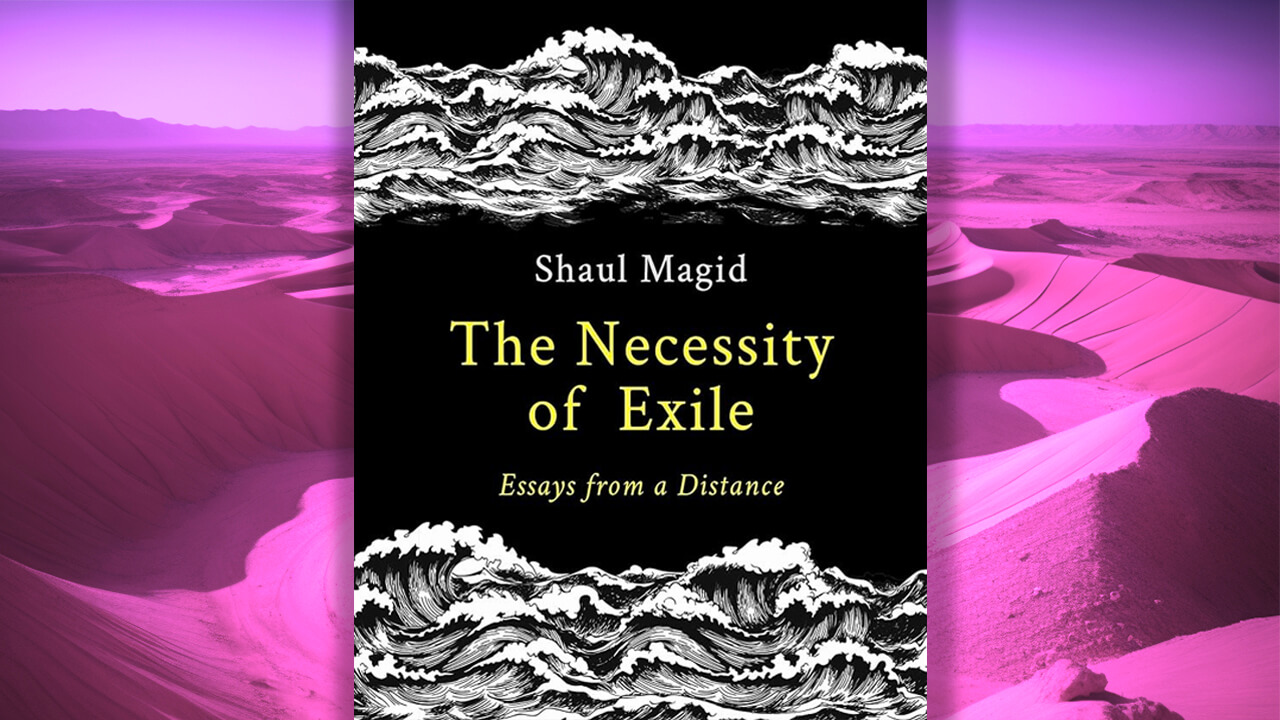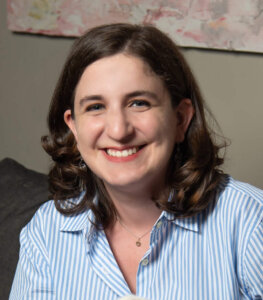A plan to save Israel — by getting rid of Zionism
Shaul Magid’s new book imagines a ‘counter-Zionist’ Jewish future

Graphic by Angelie Zaslavsky
“It is a bit strange to have it coming out now,” admits Shaul Magid, a professor of Jewish studies at Dartmouth College.
Magid is the author of an engaging new essay collection, The Necessity of Exile: Essays From a Distance. The work, which he describes as “counter-Zionist,” suggests that Jews should consider anew the benefits of living in exile — including within the state of Israel itself — and a divorce from both the two-state solution and the idea of Zionism.
It’s a lot to take in. In fairness, Magid has expressed skepticism over whether two states are possible for years, and a one-state argument from him is not surprising. What is new, however, is his articulation of how one can be for Israel while being against Zionism.
“If liberal Zionists are now forced to support an illiberal state,” he writes in one early chapter, “why not construct a new way to affirm Jewish self-determination, a path for supporting liberalism rather than being forced to support an ideology that runs counter to our basic values?”
Magid still holds onto Zionism’s idea of a Jewish state for Jews — but adds that it should not only be for Jews, and that the land is not exclusively ours to claim or give away in the first place. Some would call this anti-Zionism; Magid does not, as he feels that implies opposition to the existence of a state of Israel, and his point is that he is not opposed to the state per se.
But this reality would, he admits, “require an entirely new way of thinking about self-determination, about the historical and theological claims of a Jewish ownership of the lands that demands exclusive sovereignty … But what is the nature, even obsession, of this undying attachment to Zionism? Ideologies often succumb to obsolescence, even if that which they produce remains.”
Magid finished the book long before Oct. 7 and the ensuing war. But the questions he raises — on what the future of Israel should be, whether liberal Zionism is tenable, and how Jews around the world should relate to Israel and antisemitism — have taken on a new urgency.
‘Counter-Zionism,’ pro-Israel?
Magid hopes that his book will not be dismissed as anti-Israel. He is a citizen of the state (“albeit a very ambivalent one,” he writes). And if people come away as seeing counter-Zionism in opposition to the state of Israel itself, then the book will have been a waste of time, he tells me.
There will be some who can’t see things his way. Magid is, after all, putting forth a vision of a binational state, something that all but guarantees Jews would no longer constitute a majority in Israel. But his argument is that, while that vision is not Zionist, it is also not anti-Israel; the founders’ ideology and the state as it exists today are two different things.
I asked what he thought of the idea that Oct. 7 demonstrates that one state is totally untenable. But Magid rejects this, and believes that there will be the same political will for two states after the war as there was before (which is to say, very little).
“It used to be the case that ‘two states’ was the practical solution and one state was utopian,” he told me. “I’m suggesting maybe we’ve gotten to the point where it’s the opposite,” says Magid, who believes that the country is already in a one-state reality and that there is no real appetite for two states. “One state is not such a great solution, but it’s kind of what there is.”
In other words, while some think that Oct. 7 proved that two states are the only answer, Magid feels that the state that exists now is the state that will be there when the war ends, and that it is a state in which there is no real political will “for giving the Palestinians anything.” (One could argue that equal rights within one state is more utopian than two states, but Magid takes the opposite view.)
“I offer counter-Zionism as a way to think otherwise about the complex web of Jewish history, identity, and politics … not to distance myself from Israel, but rather to remain a believer in it,” he writes.
I do not know if the vision put forth by “counter-Zionism” is any likelier to come to fruition than that of “liberal Zionism.” But the idea of a country evolving beyond its founding ideology makes intrinsic sense: Magid compares it to the United States needing to let go of manifest destiny. But more than that, what I found compelling was that Magid encourages us to think of Israel not as an idea, or a projection of the American Jewish sense of self, but as a country.
In Israel, in exile
Many Zionists, particularly secular ones, view the creation of the state of Israel as Judaism’s ultimate success, and the triumphant end of Jewish exile. To them, Magid says, “OK. That’s what happened. That’s where we are. But I don’t think it has to stop there.”
In the 1940s, Magid writes, American Zionists made a point of being referred to as being in the diaspora, not in exile, as they did not want to be seen as being in a deficient state. But Magid reaches back into history, reclaiming exile, offering it up to the present. This, to me, was one of the most compelling parts of the book: the argument that Jews all over the world, including but not limited to the United States, can remember that being in exile isn’t lesser, and especially isn’t less Jewish.
Seeing ourselves as living in exile is essential, he says, or at least can be beneficial, to Jews and Judaism, and we should not be so quick to shrug it off. Exile, he said, “creates a sense of humility … not a state of completion.”
For our tendency to flee from the idea of exile, he blames the Holocaust. “The rejection of exile as a response to the collapse of European Jewry and subsequent murder of 6 million Jews was certainly understandable and helped accelerate the founding of the state of Israel,” he writes. And one can understand why, in this framing, exile would be seen as bad, and something to be shunned.
I pointed out that there are many who say that Israel is the most important political project of the Jewish people. “What exile produced,” he says in response, “was actually just Judaism.” The religion itself was forged out of a place of searching, of being in a state of “not yet,” of striving.
Still striving
In other words, those of us in the “diaspora,” and even those in the land of Israel, should perhaps try to cultivate that sense of exile: the humility to acknowledge that there is still work to be done.
Israel without Zionism “may have the chance of truly becoming a just and equitable polity of all its citizens,” he writes. But Jews outside of Israel benefit, too: “The Jewish diaspora may flourish without Israel as its necessary center.”
I thought, reading it, that he was asking American Jewis readers to do something hard: to imagine who we are, as Jews, outside Zionism, or Israel. What makes us Jewish? What is the “not yet” we’re trying to reach? Can we imagine it? And, if so, how would we get there?
These are all wholly worthwhile questions. But I know many will be outraged or changed — or maybe both — by the argument. Who, I asked, was Magid trying to reach?
“Who is the audience?” He thought for a moment. “I guess Jews.”
This is an opinion piece, so I will end with an opinion: I hope Jews read this book. I think it will help people navigate thoughts that are perhaps already in mind, but for which they did not have the words. And maybe they’ll agree, and maybe they won’t, but it is useful to be challenged. Some might even call it a necessity.
To contact the author, email [email protected].

















